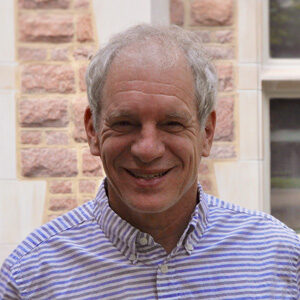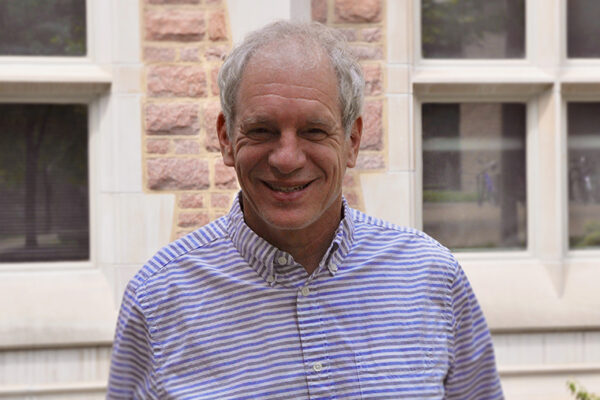Mark McDaniel is the principal investigator in the Memory and Complex Learning Laboratory. He has two main research interests: prospective memory and education. Prospective memory refers to remembering to perform intended actions in the future such as remembering to take your medication or to turn off your cell phone before you enter a lecture. Another line of research in this lab is applying cognition to education.

Mark McDaniel
Professor of Psychology
Contact Information
- Phone: 314-935-8030
- Email: markmcdaniel@artsci.wustl.edu
- Website: Website
Media Contact
In the media
Opinion: Students are pushing themselves to unhealthy limits. Here’s how teachers can help
Mark McDaniel, professor of psychology
Stories
McDaniel receives federal education grant
Mark McDaniel in Arts & Sciences received a $30,008 grant from the U.S. Department of Education for a
collaborative education research project.
Pre-lecture diagrams help students take better notes, learn more
Lecture-based learning can be challenging for students who have difficulties building mental models for the organization of new information, but providing them with diagrams and other supporting material in advance of the lecture can help them overcome these hurdles, suggests new research from Washington University in St. Louis.
Using cognitive science to improve STEM teaching is conference focus, Sept. 27-28
Developing new and innovative approaches for the
teaching of science, technology, engineering and math (STEM) is the
primary goal of an interdisciplinary conference to be held Sept. 27-28
at the Charles F. Knight Executive Education & Conference Center at
Washington University in St. Louis.
Quizzes key to learning for middle school students
Practice may not always make perfect, but a novel study of Midwestern middle school science students suggests it just might. New research from Washington University in St. Louis shows that students who received three quizzes on content questions before a unit test performed at the “A” level on those test questions, compared with a “C” level on questions that were not quizzed beforehand but still on the test.
Memory links to 40 winks
When it comes to executing items on tomorrow’s to-do list, it’s best to think it over, then “sleep on it,” say psychologists at Washington University in St. Louis. The researchers have shown that sleep enhances our ability to remember to do something in the future, a skill known as prospective memory.
A silly pat on the head helps seniors remember daily med, study suggests
Photo by Janet GumpertRemembering to take daily medications can be a challenge, but new research offers tips for strengthening those memories.Doing something unusual, like knocking on wood or patting yourself on the head, while taking a daily dose of medicine may be an effective strategy to help seniors remember whether they’ve already taken their daily medications, suggests new research from Washington University in St. Louis.
Book explores our ability to remember future intentions
Discussions of memory lapses often focus on a failure to recall past events, but equally important to our daily lives is a form of memory that helps us remember to do something in the future — drop a child at daycare, go to the dentist or pick up bread on the way home. “Memory is fallible, even for tasks that are very important,” suggests WUSTL psychologist Mark A. McDaniel, Ph.D., co-author of a new book exploring how the brain processes memories critical to planning and other forward-looking activities. “As soon as intention leaves awareness, there’s no guarantee that it’s going to be retrieved again.” More…
Book offers tips on improving memory as we age
Joe Angeles / WUSTL PhotoA new book co-authored by a memory researcher at Washington University in St. Louis is one-stop shopping for all the questions we have about memory and how serious our lapses might be as we grow older. Mark A. McDaniel, Ph.D., professor of psychology in Arts & Sciences at WUSTL, says his book, Memory Fitness: A Guide for Successful Aging, relies on many rigorous academic studies but is written for the lay person. “Our mission is to give the general public a good idea of what they can reasonably expect from their memory capabilities as they age,” says McDaniel about the book he co-authored with Gilles O. Einstein, Ph.D., professor and chair of the psychology department at Furman University. “It also outlines some reasonable expectations about things people can do to perhaps increase their memory performances.”


